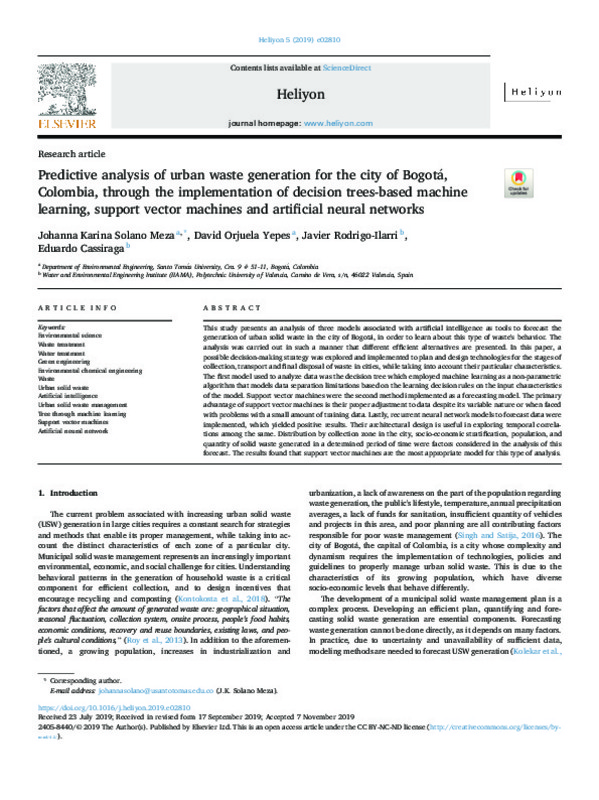JavaScript is disabled for your browser. Some features of this site may not work without it.
Buscar en RiuNet
Listar
Mi cuenta
Estadísticas
Ayuda RiuNet
Admin. UPV
Predictive analysis of urban waste generation for the city of Bogota , Colombia, through the implementation of decision trees-based machine learning, support vector machines and artifficial neural networks
Mostrar el registro sencillo del ítem
Ficheros en el ítem
| dc.contributor.author | Solano-Meza, Johanna
|
es_ES |
| dc.contributor.author | Orjuela Yepes, David
|
es_ES |
| dc.contributor.author | Rodrigo-Ilarri, Javier
|
es_ES |
| dc.contributor.author | Cassiraga, Eduardo Fabián
|
es_ES |
| dc.date.accessioned | 2020-01-16T21:01:50Z | |
| dc.date.available | 2020-01-16T21:01:50Z | |
| dc.date.issued | 2019 | es_ES |
| dc.identifier.uri | http://hdl.handle.net/10251/134687 | |
| dc.description.abstract | [EN] This study presents an analysis of three models associated with artificial intelligence as tools to forecast the generation of urban solid waste in the city of Bogota, in order to learn about this type of waste's behavior. The analysis was carried out in such a manner that different efficient alternatives are presented. In this paper, a possible decision-making strategy was explored and implemented to plan and design technologies for the stages of collection, transport and final disposal of waste in cities, while taking into account their particular characteristics. The first model used to analyze data was the decision tree which employed machine learning as a non-parametric algorithm that models data separation limitations based on the learning decision rules on the input characteristics of the model. Support vector machines were the second method implemented as a forecasting model. The primary advantage of support vector machines is their proper adjustment to data despite its variable nature or when faced with problems with a small amount of training data. Lastly, recurrent neural network models to forecast data were implemented, which yielded positive results. Their architectural design is useful in exploring temporal correlations among the same. Distribution by collection zone in the city, socio-economic stratification, population, and quantity of solid waste generated in a determined period of time were factors considered in the analysis of this forecast. The results found that support vector machines are the most appropriate model for this type of analysis. | es_ES |
| dc.description.sponsorship | This work was supported by the Santo Tomas University. | es_ES |
| dc.language | Inglés | es_ES |
| dc.publisher | Elsevier | es_ES |
| dc.relation.ispartof | Heliyon | es_ES |
| dc.rights | Reconocimiento - No comercial - Sin obra derivada (by-nc-nd) | es_ES |
| dc.subject | Environmental science | es_ES |
| dc.subject | Waste treatment | es_ES |
| dc.subject | Water treatment | es_ES |
| dc.subject | Green engineering | es_ES |
| dc.subject | Environmental chemical engineering | es_ES |
| dc.subject | Waste | es_ES |
| dc.subject | Urban solid waste | es_ES |
| dc.subject | Artificial intelligence | es_ES |
| dc.subject | Urban solid waste management | es_ES |
| dc.subject | Tree through machine learning | es_ES |
| dc.subject | Support vector machines | es_ES |
| dc.subject | Artifi | es_ES |
| dc.subject | Cial neural network | es_ES |
| dc.subject.classification | INGENIERIA HIDRAULICA | es_ES |
| dc.title | Predictive analysis of urban waste generation for the city of Bogota , Colombia, through the implementation of decision trees-based machine learning, support vector machines and artifficial neural networks | es_ES |
| dc.type | Artículo | es_ES |
| dc.identifier.doi | 10.1016/j.heliyon.2019.e02810 | es_ES |
| dc.rights.accessRights | Abierto | es_ES |
| dc.contributor.affiliation | Universitat Politècnica de València. Departamento de Ingeniería Hidráulica y Medio Ambiente - Departament d'Enginyeria Hidràulica i Medi Ambient | es_ES |
| dc.description.bibliographicCitation | Solano-Meza, J.; Orjuela Yepes, D.; Rodrigo-Ilarri, J.; Cassiraga, EF. (2019). Predictive analysis of urban waste generation for the city of Bogota , Colombia, through the implementation of decision trees-based machine learning, support vector machines and artifficial neural networks. Heliyon. 5(11). https://doi.org/10.1016/j.heliyon.2019.e02810 | es_ES |
| dc.description.accrualMethod | S | es_ES |
| dc.relation.publisherversion | https://doi.org/10.1016/j.heliyon.2019.e02810 | es_ES |
| dc.type.version | info:eu-repo/semantics/publishedVersion | es_ES |
| dc.description.volume | 5 | es_ES |
| dc.description.issue | 11 | es_ES |
| dc.identifier.eissn | 2405-8440 | es_ES |
| dc.relation.pasarela | S\397365 | es_ES |








